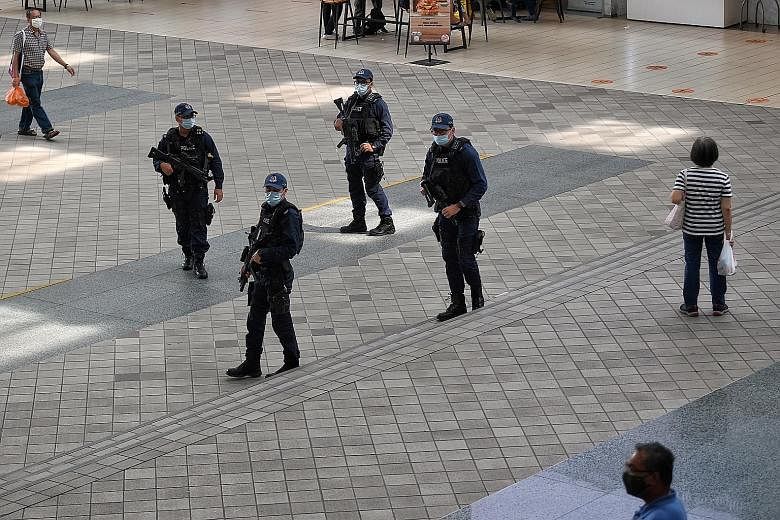SINGAPORE - The police will continue to step up patrols during the festive season to project a presence and deter public security threats and crime.
The Ministry of Home Affairs (MHA) said the police have intensified their patrols - including those by their quick-response counter-terrorism teams - since September, following terror incidents in Europe.
The heightened alert by the Home Team was in view of the deteriorating security situation with a spate of terrorist attacks in France, including the beheading of French teacher Samuel Paty in a Paris suburb in October, as well as other attacks in Saudi Arabia and Austria.
In response to queries from The Straits Times, an MHA spokesman stressed that the risk of copycat attacks in Singapore is high, with the country highly susceptible to being influenced by external developments.
Terrorist groups such as the Islamic State in Iraq and Syria have exhorted their followers to carry out lone-wolf attacks using any means, including with everyday items like knives and cars, said the spokesman. "Such attacks are hard to prevent, and can happen quickly without much warning."
The enhanced patrols include counter-terrorism patrols by the In-Situ Reaction Teams and Emergency Response Teams, which are equipped and trained to respond swiftly to public security threats.
Police and security officers will also be deployed during the year-end festivities to deter crime and respond to any law and order incidents, added the spokesman.
The Immigration and Checkpoints Authority has also stepped up security checks and screening at all checkpoints, and increased the frequency of patrols.
The authorities said last month that investigations into 37 people have started for suspected radical inclinations, or for making comments which incite violence or stoke communal unrest.
Among them was Bangladeshi construction worker Ahmed Faysal, 26, who was found to have been radicalised and had intended to carry out acts of armed violence in support of his religion, although there was no indication that he had intended to carry out violent acts in Singapore.
The Internal Security Department said he was issued with a Detention Order on Nov 30 to facilitate investigations into his terrorism-related activities.
Asked how the authorities judge if an individual's activities are dangerous enough for deportation or detention, the MHA spokesman said that anyone who engages in conduct in support of terrorism, radical ideologies or armed violence will be dealt with firmly, regardless of how such violence is rationalised ideologically or where the violence takes place.
How each individual is dealt with is carefully calibrated, said the spokesman, and is based on the severity of specific involvement in the concerned activities. Foreigners must abide by Singapore's laws and ensure their activities do not jeopardise the country's security or communal harmony.
The spokesman said it was challenging to detect radicalised individuals, disclosing that of all the radicalised individuals dealt with to date, only a handful were reported by their family or friends, or by members of the public.
Stressing that a "whole-of-society effort" is needed, the spokesman said: "All of us have a responsibility to be vigilant and to sound the alert if we should come across any suspicious activities or persons who exhibit signs of radicalisation.


